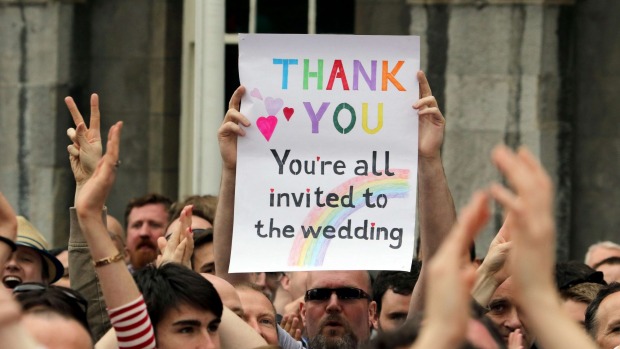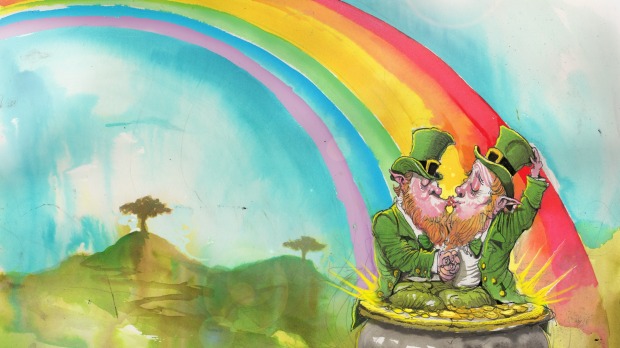Irish Gay Vote Shows Church Is Losing Tight Grip over Its Flock
By Jack Waterford
It's been an uncomfortable week – indeed it's been an uncomfortable few years --- for the declining numbers of Australian Catholics adhering firmly to the values of the church, and believing as firmly in the edicts of its leadership as in its teaching and traditions. A high proportion of Australian Catholics have origins in Irish Catholicism where, a week ago, a country overwhelmingly, if increasingly nominally Catholic, voted in a referendum for gay marriage. An institution that could bring down governments can now scarcely govern itself. The church campaigned hard for a no vote. A generation ago, as when the Irish had a referendum about divorce, that would have settled the matter. This time church opposition settled it the other way.
The conscious rejection of the church's argument was the more explicit because of its appalling record with the physical and sexual abuse of children. And of equally contemptible policies, going all the way back to the Vatican, of cover-up, and putting the commercial interests of the church and the reputation of its officers ahead of the interests of children. Advertisement The collapse of the Irish church's moral authority is witnessed by a catastrophic decline, in only 30 years, of church attendance, and political influence. Like Salazarist Portugal and Franco's Spain, Ireland was in living memory almost medieval in religious devotion and a clerical chokehold over the neck of its politicians. It is now, like much of the rest of the western world, including Australia, distinctly secular. An institution that could bring down governments can now scarcely govern itself. Even the devout now mentally limit the jurisdiction of the church to pontificate on all matters of life. Nor do they automatically revere, respect or obey an ambitious careerist clerical class imposed on congregations from above. This decline has not been solely a result of scandal and child abuse. But, in Australia, as much as Ireland, there could hardly have been a keener spur. Nor one as likely to actuate its friends as much as its fundamental enemies. In 2000 years, no open enemy of Christendom has inflicted more damage on the Catholic Church than that inflicted by its priests, its bishops and, sometimes even its popes. In Europe, North America, in Australia, and even in the developing world, Catholics have become better educated, healthier and more materially secure. They no longer respond, like sheep, to a shepherding that was once consciously as much about advancing the social, political, cultural and economic interests of Catholics as instilling within them the teachings of Christ. In civil society, women are taking their rightful place in the public square, except in the church. But the structure, teaching and evangelical style of the church, and its management, have not adjusted to suit. The laity, the actual citizens of the church, are largely objects of contempt, to be accorded only token consultation and only public respect. The church is a top-down institution, and the bishop is a delegate of a centralising Rome, not a representative, to Rome, of a local region of the church. Preferment does not come from popularity with the faithful, or carrying out local needs, but dogged subservience to a much-out-of-touch Vatican bureaucracy. The Vatican's work is keenly supported by a lay Taliban, continually searching the pulpits and the cathedrals for signs of progressiveness, heterodoxy or tolerance. The failure of church leadership to respond to social change has been mirrored by similar failures in other mainstream religions. Indeed there is a decline of automatic faith in any of the older institutions of society, from the services, the professions or the agencies of government. It's not a secular form of an emerging atheism. It's an egalitarian requirement that respect and deference be earned, and that requirements be explained and debated, and accounted for, not treated as commands. These days a church-attending Australian Catholic is as likely to be Vietnamese, Filipina, Sri Lankan, Maltese, Lebanese or Polish as from an Irish tradition, even if one would never think so when one saw the background of the bishops. That lack of modern fit itself aggravates the sense of a church leadership counting its treasure, but no longer teaching, leading or speaking for its congregations, or when it does, sounding almost comical in its incapacity to connect with or understand their actual concerns, interests and moral and ethical dilemmas. Down the track, perhaps, more traditional Catholics mourning times long gone may blame Julia Gillard for establishing a royal commission into institutional responses to the sexual abuse of children. At the time she did so, the commentators were fully aware of the politics, secular as well as spiritual, it could create. It was supposed that the church, and its supposed leader, Cardinal George Pell, would be the big victim and that the then Leader of the Opposition, Tony Abbott, a close personal and political friend of Pell, might be a collateral casualty. It was understood that the commission would not be investigating only abuse of children in Catholic institutions, but, some imagined, the looking over of other suspects would be only a sideshow. It has come to pass that the church has had a well-deserved flogging, even as, it is now clear, the commission has been able only to scratch the surface of the problem. The church itself has gone past regarding what happened as a public relations problem, the fault of a few bad apples and perhaps some early mismanagement. It now recognises not only its systemic nature but an ongoing duty to reach out to its victims. The commission and public shaming and humiliation has done far more to cause institutional change than any Melbourne, Australian or other "solution" or "model" for investigating abuse and dealing with its consequences, including compensation. But it has also become clear that the phenomenon of institutional abuse (and perhaps, but only perhaps, a marked upsurge in its incidence in the middle third of last century) was not restricted to the Catholic church. Nor was the church the only one whose leadership tended to turn away, to cover up, to bully and bluster if there were complaints, and to put the interests of the institution ahead of the interests of the people for whom the institution was established. Other religious organisations, including one run by the Anglicans, the Salvation Army and Jews, and child welfare establishments maintained by the state have been shamed and called to account. Victims have been heard, and the public has seen how the casual cruelties and failures of those charged with preventing, punishing and dealing with abuse have been as damaging as the abuse itself. Yet the commission has scarcely lifted the lid on institutional abuse, going on right now, inside our immigration concentration camps, here and abroad. Or on systemic patterns of underclass child removal, including of Aborigines, from the 1930s. Or the management of orphanages, whether by government or religious institutions, and of child migration schemes. Each of these chambers of horrors is almost worth a royal commission in itself and not only for the catharsis of letting the victims be heard. We might remember too that perhaps 80 per cent of the sexual abuse of children has been inflicted by close relatives, not religious or lay officials. The broad facts of the abuse were well known long before Gillard called an inquiry. Catholics had been publicly, if ineptly, wrestling with it for more than 30 years. So had other congregations. The horror and the brutality, and the lack of accountability of any number of welfare institutions, have long been documented, even if their consequences have been insufficiently faced. But the consequences have been special for the Catholic church and its Australian leadership. Pell, whether in his serial authority at Ballarat, Melbourne and Sydney before his translation to Rome, has been a popular villain, seemingly smug, arrogant, unfeeling, uncaring and entirely without even normal lashings of human empathy. Pell doesn't do "sincere" well. Even as he has expressed the church's regrets, shames and acknowledged its failures, his words have seem mechanical rather than heartfelt, and he has seemed churlish, and angry that his work is constantly being "distracted" by such ancient history or, as he sees it, willfully misunderstood. He might be the archetype for the expression about "not getting it". But if he might win such a contest, it would be only after the contributions of some of his brother bishops were considered. The present Archbishop of Sydney, Anthony Fisher, and the present Archbishop of Brisbane (and formerly Canberra), Mark Coleridge, have, for example, made public expressions of impatience and irritation about discussion of church sexual abuse. These have completely (and probably permanently) overwhelmed anything they have otherwise done or their sometimes thoughtful contributions to discussion of how and why it happened and why the church was for so long so blind. An old schoolmate of mine, Phillip Wilson, the Archbishop of Adelaide, is to face charges for failing to see that abuse (by another) was going on almost in front of his face. The innuendo of some of the present focus on Pell, especially from his Ballarat days, is that he must have known that some of his colleagues were abusers; hence, he must somehow be complicit in it. Some of the reportage of Pell demonstrates how the lack of understanding, even among Catholics, of church management and governance. It is not always clear if this flows from modern failure of his church to catechise even notional adherents or from personal, or sometimes semi-official anti-Catholicism and bigotry. But Pell is too senior, too arrogant and too cold and inhuman to be regarded or treated as some sort of sacrificial lamb or scapegoat, there to atone for the sins of all of his class. There is no evidence, despite the innuendo, of personal misconduct or negligence, and he can in that sense expect vindication. But his attitude, combativeness and confidence in his capacity to mix it in debate have come to symbolise everything that has been wrong. The mob may, ultimately, tear him down, but no one will ever suggest he will have been a martyr, least of all for his faith, his hope or his charity. Nor will any say that he died practicing or preaching the words of Jesus. As the political realists survey the damage, they might do well to reflect that while five in every eight Irish men and women voted for gay marriage, it was more than six in every eight among younger voters. These are willing to reject the advice, even the orders, of their church leaders. But it is completely wrong to think they lack a moral base, or that they are sunk in sin and despair. For them, voting for gay marriage was an act of affirmation of human dignity, not its rejection. For them, as with most Australians, the argument about gay rights and dignity, and a right to freedom from discrimination, is long over. Those hiding their phobias behind the church are the ones who have lost the plot, spiritually as much as politically. Indeed a good many Catholics suspect, perhaps wrongly, that the present pope is a good deal more of a realist on the subject than the teachers his predecessors have imposed on the flock.
|
.
Any original material on these pages is copyright © BishopAccountability.org 2004. Reproduce freely with attribution.

